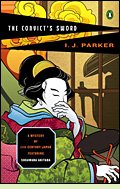I.J. Parker Interview
September 4, 2010
HistoricalNovels.info interviews the author
of the Sugawara Akitada mystery series

It was great to welcome I.J. Parker, author of the Sugawara Akitada mystery series, to the blog on September 4, 2010. The Akitada mysteries are set in the eleventh century during Japan's Heian period, when the capital was at Heian-Kyo, modern Kyoto.
So far as I know, yours is the only mystery series set so early in Japanese history. What inspired you?
Two things happened some 25 years ago: I was researching Japanese literature of the Heian period for a course I taught in World Literature, and I discovered Robert Van Gulik’s Judge Dee series. Both proved eye-opening. The writings of the court women of the early eleventh century were brilliant, far advanced for their time when compared to European literature. Lady Murasaki’s Genji, the world's first novel, is especially sophisticated. And the Van Gulik mysteries are arguably the best historical mysteries in existence. Van Gulik, a diplomat and scholar in China and Japan, chose T’ang China for his setting. I chose eleventh century Japan.
Akitada's troubles with bureaucracy seem surprisingly modern, but in other ways the Heian setting is truly exotic. What, to you, seems the most alien aspect of ancient Japan?
In many ways, Akitada is a misfit in his own time. By the eleventh century, the government in Japan was no longer a meritocracy. It was in the hands of a single family, the Fujiwaras. Capable men must have chafed under this system, which promoted only Fujiwaras to the top positions. Akitada believes passionately in order and in the imperial administration, but the conflict between his ideals and reality creates many problems.
I tend toward realism in my writing, and to me the most alien and difficult aspects of the culture have to do with superstitions. Japanese folklore is rich in miracles, demonic possessions, and the belief in shamanism. These tend to get in the way of crime investigations, as for example in Rashomon Gate and in the upcoming Fires of the Gods. In distrusting the supernatural, Akitada is unusual for his time. To make up for this, his sidekick Tora, utterly courageous in all human encounters, turns to jelly when he thinks he faces ghosts or demons.
Your mysteries are unusually suspenseful, because sometimes real tragedy strikes Akitada. What does it feel like to write about your main character losing something or someone he values deeply?
The Convict's Sword is the most tragic book in the series and by far my favorite. Those very painful scenes almost wrote themselves. The story just felt right and still does. Readers don’t always agree. They like their vicarious adventures to take them to safer places, but I believe the characters we truly identify with are the ones who face hardships and err like all of us. The final scenes in The Convict's Sword took me more completely into the story than any scene before or after. But people survive terrible loss. In the current novel, The Masuda Affair, Akitada pieces his life together again.
Review of The Convict's Sword by I.J. Parker
See the Sugawara Akitada mystery series at Powell's Books
See the Sugawara Akitada mystery series at Amazon.com
Back to Directory of Author Interviews
Enjoy this page? Please pay it forward. Here's how...
Would you prefer to share this page with others by linking to it?
- Click on the HTML link code below.
- Copy and paste it, adding a note of your own, into your blog, a Web page, forums, a blog comment, your Facebook account, or anywhere that someone would find this page valuable.